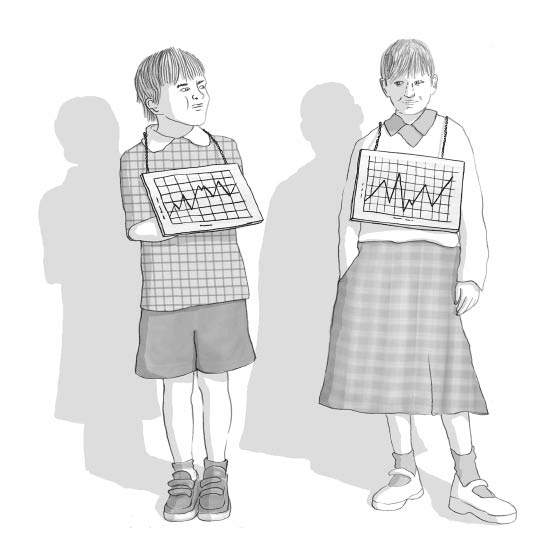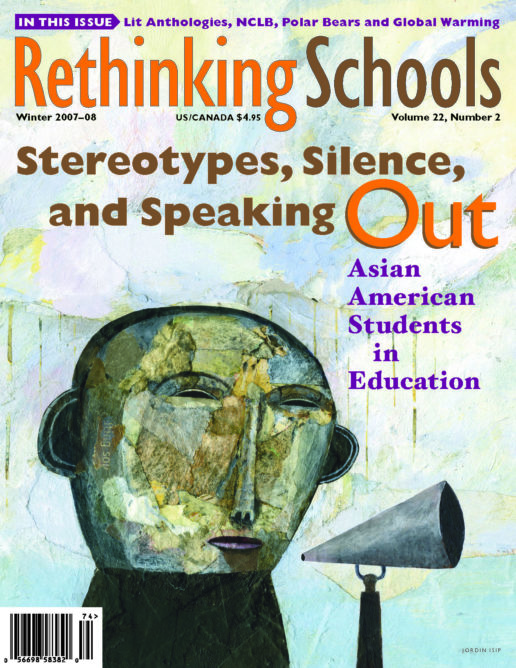Wish You Were Here
Illustrator: Alain Pilon

Editors’ Note:
In January 2007, Education Week released the 11th annual Quality Counts report. The report, “From Cradle to Career: Connecting American Education from Birth to Adulthood,” takes a much broader view of K-12 education than did previous reports by considering multiple educational, social and economic factors within states. The report provides 1) a “chance-for-success” index that ranks states on indicators such as parental education, family income, postsecondary participation rates, NAEP scores, high school graduation rates, and so on; 2) an overview of state policies to align K-12 education with preschool, college, and the workplace; 3) a K-12 state achievement index and; 4) the traditional State of the States ranking based on standards, assessment, and accountability policies.
QC reports, produced by Education Week’s Editorial Projects in Education with support from the Pew Center on the States, have always ranked Nebraska low in that fourth category, as University of Nebraska-Lincoln professor Chris W. Gallagher notes in the following satirical piece. This is because, as Gallagher has noted in previous publications, Nebraska has pursued a statewide system of local assessments and eschewed high-stakes tests, while the QC criteria reward state tests with sanctions attached to them.
Nebraska’s unique School-based, Teacher-led Assessment and Reporting System (STARS) requires each district in the state to develop its own assessment process-though many do so in collaboration with other districts or with regional educational service units. Districts measure student learning on state or approved local standards in various ways. Some develop districtwide, criterion-referenced assessments. Others rely heavily on classroom assessments. Most devise a combination of these. Districts receive both written and oral feedback and two public ratings: one for student performance and one for assessment quality. STARS is currently the only state assessment and accountability system that does not rely on state tests to measure student learning on standards.
Gallagher’s book on STARS, Reclaiming Assessment, was published in 2007. Additional information about STARS, including annual reports of the Comprehensive Evaluation of STARS, may be found at www.nde.state.ne.us/stars/STARSTechnicalReports.htm.
Postcard from the state ranked 51st
Dear Quality Counts 2007:
Greetings from Nebraska!
So good, as always, to hear from you. As a red-blooded American, I love to count things. I can’t get enough numbers, charts, graphs, and, above all, rankings. And you never disappoint.
But I have to say, you’ve really outdone yourself this year with your Cradle to Career report. I love the cradle-to-career image, and not just because of the cute alliteration. What’s great about it is that it allows you to come right out and treat states and schools like companies making investments in human capital instead of, say, public trusts dedicated to fostering democratic citizenship. (Honestly, I’d never thought of babies, like the cute one on the cover of the report, as bundles of capital just waiting to have value added to them. So obvious!) No messy talk of helping youngsters learn to be good people, or learning to live well together, or any of that soft stuff. It’s all about economic competitiveness and getting ahead. And as your title shows, this kind of hard-nosed thinking simply cannot begin early enough. I only wish you’d taken it just a bit further-maybe “From Conception to Career”? I’m thinking next year you might try From Embryo to Employment or at least From Womb to Work. Think about it.
In the past, I’ll admit I have been critical of your accounting methods. I didn’t like the way you simply counted up the number of tests and “sanctions” and rewarded states for “reforms” that we could all see were leading to narrowed curriculum, deprofessionalized teachers, anxious kids, emphasis on rote memorization rather than higher-order learning, misuse and misreporting of data, cheating scandals, and so much more. And I didn’t like that you gave Nebraska low grades for its unique statewide system of local assessments, which sought to avoid those negative consequences of high-stakes state testing while ensuring high-quality classroom assessment aligned to standards, just because that approach didn’t fit your metric (oh, that sonorous word!).
But after reading your new report, I see that all along, I was thinking too broadly about the purpose of schooling. I had thought we wanted schools to be places where adults and kids learn together, where they practice the arts of democratic citizenship, where they reason and deliberate and wonder and imagine and create, where they build strong, mutual relationships of trust and respect. Of course I knew that careers are an important part of adult life, and certainly, I thought schools should help kids develop skills, dispositions, and capacities that would serve them in the world of work. But I confess-and I’m almost embarrassed to admit this now-I didn’t think of these purposes as separate. I thought preparing students to live well in a diverse democracy would also help them prepare for careers. But now I see that I overshot the mark. From Cradle to Career-so elegant, clean, crisp.
It seems funny to me now, but when I visited Nebraska schools both as a researcher and as a parent and saw teams of teachers working together, having intense professional conversations, I thought that was a good thing. When I saw teachers designing assessments and embedding them into their instruction, I was impressed. When I saw them document the quality of those assessments using Nebraska’s six quality criteria, I was impressed by the validity and reliability of these local assessments. When I saw teachers becoming leaders for school improvement in their buildings and districts, I thought, “Now that’s the kind of teacher I want my kids to spend time with.” When I saw kids being assessed at or near the point of instruction, rather than stopping learning to take a Big Test, I actually believed that was what should be happening in schools. And I felt good about the rising proficiencies on district assessments, the increases in the quality of those assessments as determined by external assessment experts, the sharp rises in Nebraska students’ scores on the statewide writing assessment and their stable performance on nationally normed tests (traditionally high in the first place), the rising graduation rates, and the falling dropout rates.
But then I read your report and realized what a fool I was. I mean, we’re 49th on “Aligning Education from Cradle to Career.”
49th!
And to be honest, it’s partly my fault. When I was co-chair of the Nebraska PreK-16 English/Language Arts Task Force, we considered ideas like aligning high school assessments with the postsecondary system. But did we have the guts to follow through? We did not. Instead, we wrung our hands over details such as the colonization of the high schools by the colleges and decided to give up alignment in favor of the softer goal of “articulation” among the different levels. We wanted teachers to “be at the table,” not just be told what to do. But now I see that if we had just kept a laser-like focus on careers and not fretted about what happens while kids are in school, we needn’t have worried so much about coddling teachers. After all, what do teachers know about careers? They’re teachers!
If only we had just done what other states are doing. Look how well things are going in high-stakes testing states. The economy is gobbling those young workers right up. I hear these bubblers are in such demand that they aren’t even finishing school!
That’s why Nebraska just has to make an effort to raise our rankings, especially on standards, assessment, and accountability. I’m not very good at imaginary numbers (hey, I’m a Nebraskan), but even I know 51st out of 50 is not good. For all those feel-good things I saw in Nebraska schools, I did not see state tests “vertically equated,” to use your felicitous phrase. Sure, I saw a lot of coherent K-12 district assessment systems, and yes, all districts need to show that their assessments are developmentally appropriate at all levels. But Nebraskans stubbornly refuse to use a single state test. They believe meaningful school improvement must come from within-through the commitment and capacity of its educators. They believe the most important decisions about teaching and learning happen in classrooms, not conference rooms or boardrooms. They believe the most important assessment instrument is a teacher, not a test. They believe assessment should be embedded in instruction and curriculum, not imposed from outside. They believe that communities are responsible for education and that schools ought to be accountable first and foremost to those communities, not to distant policymakers or testing companies. Silly, huh? Who knows more about what it takes to mount a successful career than a policymaker or a testmaker?
I am disappointed in one feature of the report, though: your insistence on looking at what actually happens as a result of schooling. The thing I’ve always admired about you is the way you assiduously ignore the consequences of what you reward-the accountability reforms you tout but have no reason to believe actually work, for example. But now you’re actually looking outside of education to see how well kids are likely to do when they graduate. But look at what happens when you do that. You’ve been giving Nebraska low grades for years-and now we’re near the top of the heap? Even with some of the poorest counties in the nation and rapidly changing demographics, we rank ninth on the chance-for-success index. Family income remains high. Parents are well-educated and gainfully employed. NAEP scores are high. Graduation rates look good. Postsecondary participation is above the national average. In fact, Nebraska’s state averages outstrip national averages on 12 of the 13 “success indicators.” Compare that to, say, Georgia, which ranks 38th in chance-for-success but is fourth in alignment and ninth in standards, assessment, and accountability. It doesn’t add up.
I hate to agree with Chester Finn’s The Education Gadfly, which is no friend of Nebraska’s, but Finn and Co. are right that you’ve erred in broadening your focus beyond education. Open that door, and pretty soon people will be saying what most ails schools is not “the soft bigotry of low expectations,” but the hard bigotry of systemic inequality. They’ll want us to move beyond warm platitudes, bold declarations, and party-line policies. They might even start talking about humane public policy in general-housing, health care, adult literacy, the whole thing. Or they’ll want you to start looking at real social-justice educational policies-the kind that would provide high quality professional development for all teachers in all schools, fix broken school aid formulas, stanch resegregation, and empower kids, teachers, parents, and communities with the intellectual freedom and capacity they need to take control of education.
Who would want to go down that road when you can sit around and devise indexes and rankings and play with imaginary numbers? Not you, I trust.
Keep up the good work. I can’t wait to see next year’s report!
-Chris W. Gallagher

